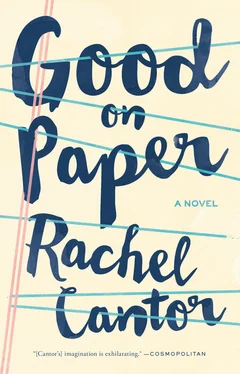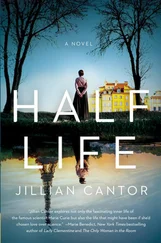I hate pumpkin, my beautiful baby said. I kissed her angel cheek. The bad man did it.
What? Had someone hurt my baby? Then I remembered Nancy Drew.
The perils of late-night reading.

I returned to the study. Maybe I was ready to try again. I retrieved the book from my pile, this time the English version with the simpering figures on the cover, a Renaissance vision of the supplicant Dante, the celestial Beatrice. My response was visceral: a trembling of the veins, a heaviness of the head.
Life had offered little recompense for the love I’d lost. I was twenty-seven when I learned that T., thief of my heart, had married.
We were in the Village — my father’s apartment, I don’t remember why. I still imagined new life with that old love — a fairy tale that began in Rome when I was fifteen and danced for him in the chem lab, imagining myself his Salomé. It didn’t matter that in high school he was all but engaged to Lavinia, just as, twelve years later, it didn’t matter that he lived in D. C. with Diana: I still believed in happily ever after. It was only with me he could be himself , he said. Washington was so full of phonies, and Diana — well, there was a limit to what she could understand. It would happen, I still believed. Feelings as strong as ours didn’t come out of nowhere.
We made love on the couch that day breathlessly: we didn’t make it to a bedroom, we rarely did. After, unclothed, I danced for him, because he asked, because I felt no shame. I was turning a dreamy circle, when I caught a glint of gold.
I stopped short; my hair, which was long then, and innocent, fell into my face.
What’s that? I said.
My love tool! he laughed, because he thought I was pointing at his thing (as he called it). But no, I was pointing at something far more potent — that thing on his finger. His gaze darted guiltily. I saw that he’d meant to take it off, that he’d always taken it off.
Dante was no help: if I’d had a gun, I’d have shot his thing —for all those years of subtext, for making me believe what I wanted to believe, which was that we were meant to be. I didn’t have a gun, so I attacked him: punching his chest and pulling his long Nordic hair, pounding his ribs and scratching his arms. I even bit his cheek — for all the times I’d been careful to never leave a mark, to never ever leave a mark.
Take that to your Princess Di!
He used his tennis arms and elbows to hold me off. I realized he had an erection — my anger was turning him on! Defeated, I let him go, found my father’s bathrobe, told him he had to leave.
I didn’t want to hurt you, is what he said as I pushed him out the door.
After, something made me look in the White Pages: if he could lie about his marriage, he could lie about anything, and there it was, his name, his address, not in D. C. but New York, the Village, just blocks from my father’s apartment.
Every few weeks that dreadful season, I pulled my hair back and walked. I told myself I needed to think and I walked — from the Upper West Side to his tawny, tony townhouse, with its black iron banister, its box of geraniums, its garden the size of three loaves of bread. I stood across the street, under a stunted tree, partially hidden by its piebald leaves, looking for T. through the blinds, trying to understand where I’d gone wrong. I imagined Diana, his virgin hunter, wearing gardening gloves and Land’s End chinos, kneeling over that paltry bit of earth; she , I knew, could make something grow — why not me?
I was unmoored. The universe, which had seemed benign, ordered, concerned with my future, revealed its indifference. I stopped going to classes, I disconnected my phone, took up smoking, cut my hair with garden shears, stuffed everything that reminded me of him into a garbage bag and, exhausted, allowed it to sit, gaping, on the living room floor. My dissertation, which included the translation and introductory essay, devolved into a disquisition on the impossibility of love, the impossibility of translation, our shameful, sham-ful enterprise. I published the essay, what there was of the translation, and married. And never loved again.
Fifteen years later, the lines of Dante’s little book still wrapped like ivy around my inability to finish my degree, the collapse of my belief in a life made new by love. How could I return to Dante, how could I entwine myself in his lines, his lies, his lying arms?
I put Dante back in his rightful place at the bottom of the pile and went online. A happy voice advised me that I Had Mail . From Benny.
Thanks for coming by!
I’d barely replied when I got an instant message from “Jellyroll_Baruch”: Bartleby?
Ahab! I typed back.
Late, isn’t it? Don’t mommies get up at the crack of dawn?
Sometimes we worry till the crack of dawn.
Andi okay?
She’s fine. Why’re you up?
Got any flags? he wrote. We could semaphore out the window. Then he “laughed out loud.” I enjoyed your visit, he added. Let’s not wait another year.
You could call my cell, you know. You wouldn’t wake anyone.
There was a pause.
I like writing you, he typed back.
Oh , I said.
Don’t think I didn’t notice you didn’t answer my question before. Do you believe in forgiveness? What do you think it is?
Forgiveness? I wrote. Whence your interest in forgiveness?
It’s the month of Elul, he wrote. Our time of reckoning. I tend not to do such a good job — asking for forgiveness, forgiving others. You know the drill. Help a poor Jew out.
Why did Benny think I knew anything about forgiveness? He knew my history, he knew my mother’s original sin. Couldn’t he let it lie?
My reply: I don’t know the drill: I’m an unbeliever. I don’t see the point of ritualizing our expiation of guilt. Does fasting make our anger go away? Does saying I’m sorry make anything better? We hurt people, people hurt us — we get over it or we don’t. No matter what, we feel bad.
I sent the message, then waited. Benny was thinking, or I’d put him off with my reply.
More , he said.
More?
Yes, please.
If that’s true, I wrote, what can forgiveness possibly mean? You pretend a thing didn’t happen? You acknowledge that it happened but pretend it doesn’t matter? If it matters, then by definition forgiveness isn’t possible. If it doesn’t matter, what’s to forgive?
Silence.
More , he said.
Really?
More. I’m listening.
I thought a moment, then typed:
Dante suggests a three-part technology for penance: Confession (admit your sin), Contrition (feel sorry for what you’ve done and say so), Satisfaction (make reparation and change your evil ways). This makes sense to me. But I don’t think he tells us how to forgive.
More silence. I checked my horoscope. Change is afoot , it read, which made me laugh. Was it really a foot? What were its preferences in footwear?
As you point out, Benny eventually replied, there’s a lot in our traditions about how to atone, less on how to forgive. Apologies help, but what if the offender isn’t sorry, what if the damage is very great?
My point exactly! I wrote. Are you worried about forgiving or being forgiven? Knowing your good sweet nature, I assume it’s the former.
You’ve too high an opinion of your old friend. Or maybe you expect too much of ‘persons of the cloth.’ We all do things we wish we could undo, no?
Читать дальше













